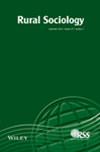能源服务安全促进公共卫生复原力:密歇根州上半岛西部的认知与担忧☆。
IF 1.9
3区 社会学
Q2 SOCIOLOGY
引用次数: 0
摘要
密歇根州西部上半岛包括六个农村县和一个部落民族。该地区的特点是冬季漫长、采矿经济遗留下来的问题以及极端农村的基础设施特点,包括住房老化和医疗服务密度低。该地区还面临着异常高昂的电价。由于气候变化导致天气事件的强度和频率不断增加,农村地区能源服务中断对公共健康的影响方面的研究十分有限。本文介绍了研究结果,探讨了该地区医疗卫生机构在应对可能中断能源服务的恶劣天气的强度、严重程度和频率不断增加方面的准备情况。研究还考虑了这些知识如何指导决策,以改善能源服务的获取,并保持该地区公共卫生服务的弹性。这项探索性研究采用了一种定性方法,将对公共卫生利益相关者的半结构式访谈与一项简短的调查相结合,以便对卫生机构的调查结果进行三角测量。鉴于可靠的能源服务在社区健康中的关键作用,这些研究结果强调了社区对自力更生的看法,认为它既是一种资产,也是一种障碍。这种观念与处于关键基础设施 "末端 "的农村社区的现实情况相吻合,这也成为能源服务中断期间社会组织和基础设施使用的巨大障碍,会严重影响公众健康。本文章由计算机程序翻译,如有差异,请以英文原文为准。
Energy Service Security for Public Health Resilience: Perception and Concerns in Western Upper Peninsula of Michigan☆
The Western Upper Peninsula of Michigan includes six rural counties and one Tribal Nation. The region is characterized by long winters, legacies of the extractive mining economy, and the infrastructural features of extreme rurality, including aging housing and low health service density. The region also faces exceptionally high electricity prices. There is limited research on the public health implications of energy service disruption in rural regions resulting from the increasing intensity and frequency of weather events caused by climate change. This article presents research findings examining the readiness of health facilities in this area to manage the rising intensity, severity, and frequency of severe weather that could disrupt energy services. The study also considers how this knowledge can guide decision‐making to improve energy service access and maintain resilient public health services in the region. This exploratory study utilized a qualitative approach that combines semi‐structured interviews with public health stakeholders and a short survey to triangulate the findings from health facilities. Given the pivotal role of dependable energy services in community health, these findings underscore the community's perception of self‐reliance as both an asset and a hurdle. This perception aligns with the realities of rural communities at the “end of the line” regarding critical infrastructure, which also serves as a formidable barrier to social organization and infrastructure access during energy service disruptions that can severely impact public health.
求助全文
通过发布文献求助,成功后即可免费获取论文全文。
去求助
来源期刊

RURAL SOCIOLOGY
SOCIOLOGY-
CiteScore
4.60
自引率
13.00%
发文量
47
期刊介绍:
A forum for cutting-edge research, Rural Sociology explores sociological and interdisciplinary approaches to emerging social issues and new approaches to recurring social issues affecting rural people and places. The journal is particularly interested in advancing sociological theory and welcomes the use of a wide range of social science methodologies. Manuscripts that use a sociological perspective to address the effects of local and global systems on rural people and places, rural community revitalization, rural demographic changes, rural poverty, natural resource allocations, the environment, food and agricultural systems, and related topics from all regions of the world are welcome. Rural Sociology also accepts papers that significantly advance the measurement of key sociological concepts or provide well-documented critical analysis of one or more theories as these measures and analyses are related to rural sociology.
 求助内容:
求助内容: 应助结果提醒方式:
应助结果提醒方式:


